In celebration of World Youth Skills Day on July 15, we are excited to share insights from our latest survey. This survey gathers perspectives from HR professionals and business owners across diverse industries. This report delves into the most sought-after skills in 2024, the impact of AI on workplace expectations, and what employers anticipate from today's youth. The findings highlight a significant trend towards valuing practical AI skills over traditional formal degrees, reflecting the evolving priorities in hiring practices.
Table of Contents
- 1. Methodology
- 2. What skills are employers looking for?
- 3. Key Insights
- 4. Conclusion: Thriving in the AI-Driven Present
Methodology
The Employer Expectation Survey was rolled out to business owners and HR professionals, with 1,156 participants contributing their perspectives. These participants represent organizations that collectively employ over 200,000 professionals. While respondents represented various industries, most came from knowledge-based and service sectors like IT, ITES, banking/financial services, consulting, and technology, among others. This focus provides valuable insights into the rapidly evolving, technology-driven job market.
The survey covered over 30 industries, with approximately:
- 82% from knowledge-based and service industries
- 18% from other sectors
The survey explored five key questions about skills demand, AI impact, and hiring preferences in 2024. This approach gives us a clear picture of employer expectations, especially relevant for youth entering tech-oriented fields.
What skills are employers looking for?
The Modern Workplace Demands a Balanced Skill Set
When asked what matters most, employers highlighted technical proficiency, with role-based technical skills leading at 40% of demand. This underscores the importance of specialized knowledge in various professional domains.
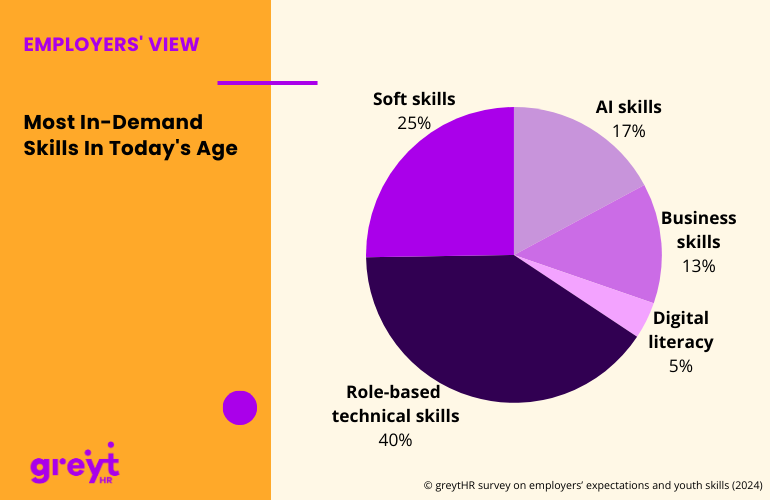
Soft skills emerged as the second most valued category at 25%, emphasizing the need for interpersonal abilities, communication, and adaptability in the workplace. AI skills followed at 17%, indicating a growing recognition of their significance across industries. Business skills and digital literacy, while fundamental, represented a smaller slice, possibly because they are increasingly considered baseline expectations.
AI and Digital Transformation Have Significantly Impacted Skill Requirements
We also asked organizations, "How much have AI and digital transformation impacted your need for new skills?" The responses provided significant insights:
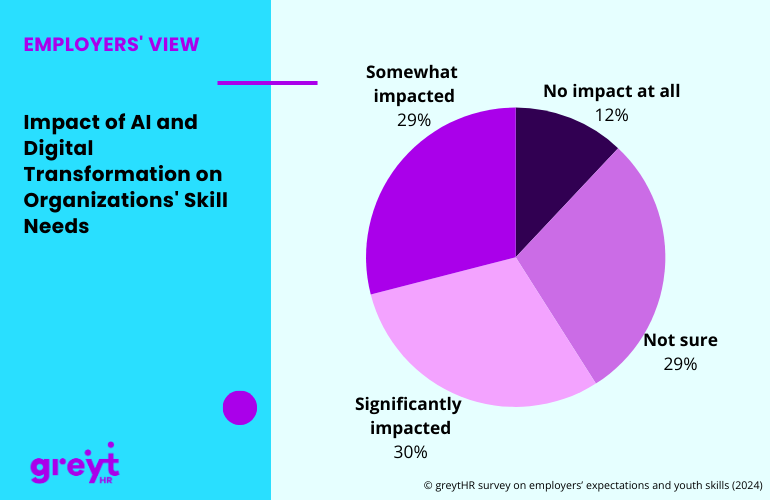
- 30% of organizations reported a significant impact, highlighting the extensive changes in skill requirements due to technological advancements.
- 29% felt somewhat impacted, indicating moderate shifts in skill needs.
- Another 29% were unsure, suggesting ongoing assessment of the impact.
- 12% saw no impact, reflecting a minority unaffected by these changes.
These findings underscore the broad influence of AI and digital transformation on organizational skill requirements, emphasizing the need for continuous adaptation and upskilling in the modern workplace.
Soft Skills: No Longer Just a 'Nice-to-Have'
A significant majority, 52%, consider soft skills important for all roles, emphasizing their universal importance. Additionally, 28% of respondents find soft skills important based on specific job roles, while 8% believe their importance varies with hierarchy or seniority. Only 12% of respondents do not consider soft skills important in their hiring criteria.
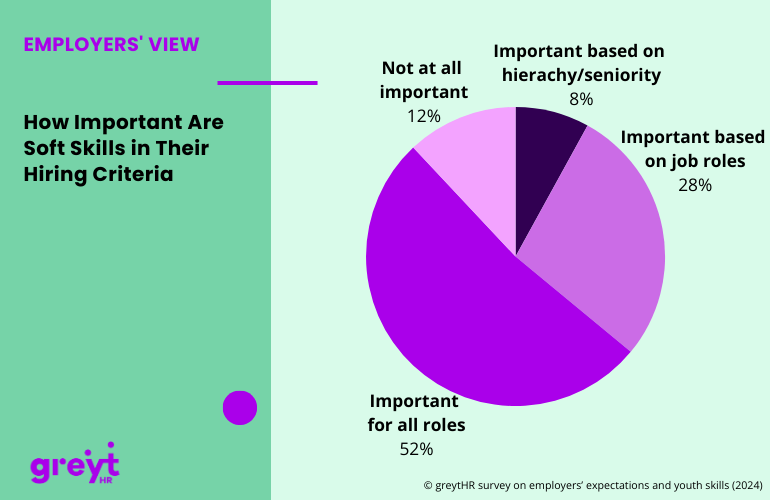
This highlights a strong trend towards valuing soft skills in the workforce, suggesting that candidates with well-developed soft skills are more likely to be favored in the hiring process across most roles.
AI Skills Gain Edge Over Formal Degrees in Hiring Decisions
In response to the question, "How important are AI skills compared to formal degrees in their hiring decisions?", employers reveal a shifting landscape in hiring priorities. A combined 60% of employers view AI skills as either equally important (35%) or more important (25%) than formal degrees, signaling a strong trend towards valuing practical tech skills.
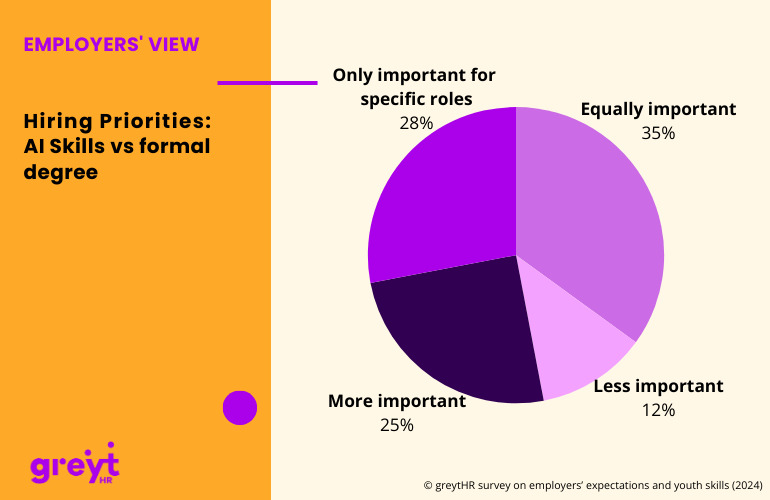
Additionally, 28% of employers consider AI skills important for specific roles, suggesting a nuanced, job-specific approach to skill evaluation. Only 12% still prioritize formal degrees over AI skills, indicating a clear shift in employer preferences.
Employers Strongly Favor Self-Directed Learning for AI Skill Development
The survey results reveal a strong preference among employers for self-driven learning when acquiring AI skills. Nearly half (49%) of employers prefer candidates who take initiative in their own education (AI and other new skills). This is followed by on-the-job learning at 30%, suggesting that employers also value practical, hands-on experience. In-house training programs (14%) and company-funded courses (7%) are less favored, indicating that employers may be looking for candidates who are proactive and demonstrate self-reliance and initiative in skill acquisition.
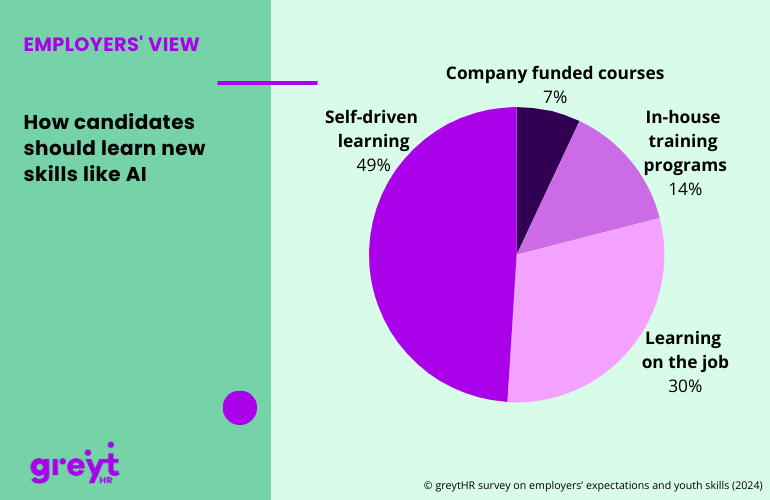
This trend underscores the importance of self-motivation and continuous learning in the rapidly evolving field of AI. Job seekers and professionals aiming to enhance their AI skills might benefit most from self-directed learning approaches, while also seeking opportunities for practical application of these skills in work environments.
Key Insights
- Skill Demand: Role-based technical skills (40%) and soft skills (25%) top the list, with AI skills (17%) gaining importance.
- AI Impact: 59% of organizations reported that AI and digital transformation have impacted the skill needs of their workforce.
- Soft Skills: 52% of employers consider soft skills important for all roles, emphasizing their universal value.
- AI vs. Degrees: 60% of employers view AI skills as equally or more important than formal degrees in hiring decisions.
- Learning Preference: 49% of employers favor self-directed learning for acquiring AI skills, followed by on-the-job learning (30%).
- Adaptability: The results highlight the need for a workforce that can quickly adapt to technological changes and continuously update their skills.
- Balanced Skillset: Employers seek candidates who combine technical expertise with strong interpersonal abilities and adaptability.
Conclusion: Thriving in the AI-Driven Present
The survey results highlight a pivotal shift towards AI competencies in the job market, signaling a need for transformation in educational and career development strategies. While the findings offer robust insights, it's important to note that they may be more reflective of the knowledge and service sectors due to their higher representation. Perspectives from other industries, although valuable, have less statistical weight in the overall findings.
Overall, Technical expertise remains essential, but employers seek well-rounded professionals who excel in interpersonal abilities and adaptability. Proactive, self-motivated learners who continually update their skills are highly valued.
Today's youth must embrace continuous learning and agility to thrive in the modern job market. Balancing technical know-how with soft skills and staying abreast of emerging technologies will enable them to navigate and excel in an ever-evolving employment landscape.
Disclaimer
The findings presented in this data story are based on a specific and limited data set. While the survey provides robust insights, readers should note that the findings may be more reflective of knowledge and service sectors due to their higher representation. The perspectives from other industries may require further exploration in future studies to provide a more comprehensive view of those specific sectors.
It is important to exercise discretion when applying these findings to other sectors or business contexts. We encourage readers to interpret and apply the data thoughtfully, considering their organizational context and consulting additional resources or experts as needed.
About greytHR
greytHR is a full-suite HRMS, with the most advanced Payroll and Workforce Management in India and the Middle East region.
greytHR simplifies, expedites, and even automates complex, recurring, and yet critical functions of HR and Payroll, in a compliant and secure way. greytHR offers productivity tools for better people management, simpler HR processes, and professional delivery of HR and Payroll services.
With a broad range of HR products, greytHR is particularly strong in Administrative HR, Payroll, Workforce Management, and Employee Engagement. The platform also offers an app marketplace (to enable affinity use cases), mobile ESS, and lossless implementation. While other HR products barely scratch the surface, greytHR has productized deep and complex HR tasks.
Currently, greytHR is trusted by over 23,000 organizations and 2.3 million users across more than 25 countries, including the UAE, Saudi Arabia, Qatar, Oman, Kuwait, and Bahrain, highlighting its global reliability and effectiveness.
greytHR's Role in Upskilling
greytHR is dedicated to helping young people on their learning journey. Through the greytHR Academy, we offer training programs and resources specifically in the HR and Payroll space. These programs help young professionals develop the skills they need to succeed and make a positive impact in their workplaces.